Last month, The New England Journal of Medicine published an article entitled, Primary Prevention of Cardiovascular Disease with a Mediterranean Diet, which discusses a trial conducted in Spain that demonstrated a Mediterranean diet supplemented with extra-virgin olive oil or nuts resulted in a substantial reduction (30%) in the risk of major cardiovascular events.
I have to say I wasn’t too surprised by the findings as the Mediterranean Diet is known to be rich in fresh fruits and vegetables, nuts, seeds, beans, fish and healthy fats. However, this is the first scientific study that has measured the direct impact of a specific diet on cardiovascular risk.
The Mediterranean diet is based on food patterns typical of Crete, much of the rest of Greece and southern Italy in the early 1960’s, where the diet is characterized by an abundance of plant foods (fruit, vegetables, breads, other forms of cereals, potatoes, beans, nuts and seeds); minimally processed, seasonally fresh, and locally grown foods; fresh fruit as the typical daily dessert, with sweets containing concentrated sugars or honey consumed a few times per week; olive oil as the principal source of fat; low to moderate amounts of dairy products (mostly cheese and yogurt), fish and poultry; zero to four eggs consumed weekly; low amounts of red meat consumed; and low to moderate amounts of wine consumed, normally with meals. (source: Mediterranean diet pyramid: a cultural model for healthy eating, Am J Clin Nutr 1995)
The trial was conducted with two Mediterranean-diet groups: both were assigned to a Mediterranean diet, but one was supplemented with extra virgin olive oil, the other with mixed nuts. The third group was assigned a low-fat diet. All the participants were people at high cardiovascular risk (men age 55-80 and women age 60-80 with no cardiovascular disease at enrollment, who had either type 2 diabetes or at least 3 major risk factors: smoking, hypertension, elevated LDL cholesterol levels, low HDL cholesterol levels, overweight or obesity, or a family history of premature coronary heart disease).
So what were some of the most important things I learned from the article?
- A Mediterranean diet supplemented with extra-virgin olive oil or nuts resulted in a substantial reduction (30%) in the risk of major cardiovascular events
- The Mediterranean diet is the most likely dietary model to provide protection against coronary heart disease
- No calorie restriction was advised nor physical activity promoted (suggesting that diet alone can impact cardiovascular health)
- Dropout rates were higher in the control group (low-fat diet) than in the Mediterranean diet groups (suggesting low-fat diets are harder for people to maintain than Mediterranean diet)
- More research needs to be done to see if the same holds true for people at lower risk of cardiovascular disease
- The study did not look at risk factors like cholesterol or hypertension or weight – it looked at primary end points – heart attacks, strokes and death (diet had a direct impact on the end point)
- Until now, evidence that Mediterranean diet reduced risk of heart disease was weak based mostly on studies showing that people from Mediterranean countries seemed to have lower rates of heart disease – a pattern that could have been attributed to factors other than diet
- Dr. Estruch, who conducted the study, thought the effect of the Mediterranean diet was due to the entire package, not just the olive oil or nuts (suggesting a balanced diet, rather focusing on any particular food group)
- The study was stopped sooner than planned, just shy of 5 years – Dr. Estruch did not expect to see such a big effect so soon (suggesting that the Mediterranean diet can help prevent cardiovascular disease in a short period of time)
So, what are some things we can do from a dietary perspective to improve our heart health? (these were the recommendations given to participants in the Mediterranean-Diet groups)
- Eat a diet high in fruits ≥ 3 servings/day
- Eat a diet high in vegetables ≥ 2 servings/day
- Consume more olive oil ≥ 4 T/day (in place of, not in addition to, other fats/oils (this includes oil in baked goods))
- Eat more fish (especially fatty fish), seafood >=3 servings/wk
- Eat more tree nuts and peanuts ≥ 3 servings/wk (one serving = 30 g; participants were given 15 g walnuts, 7.5 g almonds, 7.5 g hazelnuts)
- Eat more beans and legumes ≥ 3 servings/wk
- Eat white meat instead of red meat
- Enjoy wine with meals (optionally, only for habitual drinkers) ≥ 7 glasses/wk
- Eat less red meat/processed meats < 1 serving/day
- Eat minimal spread fats (e.g., butter, cream, margarine) < 1 serving/day
- Eat less commercial bakery goods, sweets, and pastries) < 3 servings/wk
For some Mediterranean diet inspiration – give this Roasted Beet Orange Pumpkin Seed Salad a try. Mix and match your favorite fruits, vegetables, nuts or seeds in this salad.
Mixed Green Salad with Roasted Beets, Orange, Pomegranate Seeds and Pumpkin Seeds
Ingredients
- 4 handfuls of mixed salad greens
- 4 small roasted beets
- 2 oranges peeled and sliced
- 4 tablespoons pomegranate seeds
- 4 tablespoons toasted pumpkin seeds
- 2 tablespoon extra virgin olive oil
- 4 tablespoons fresh orange juice
- salt and pepper to taste
Instructions
-
Arrange salad greens on four plates. Place roasted beets and sliced oranges around salad. Sprinkle with pomegranate seeds and pumpkin seeds.
-
Mix together olive oil and orange juice. Season with salt and pepper. Drizzle on salad just before serving.
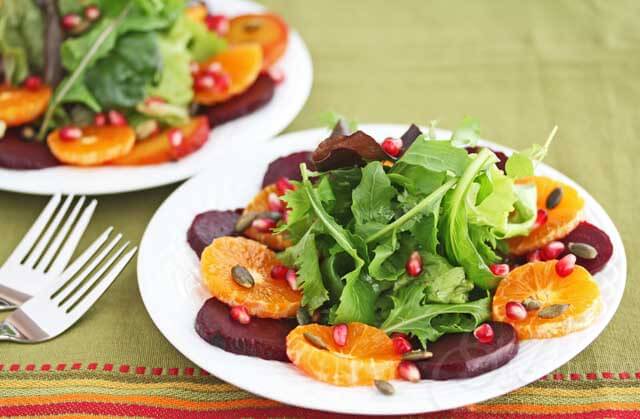
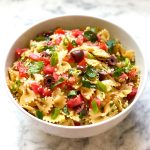
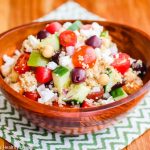

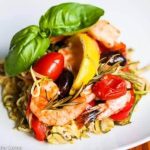
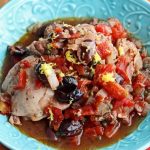
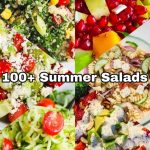
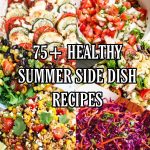


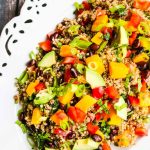
I do my best to follow the diet… though sometimes I stray away. But salads like this will always keep me in line 🙂
Brian – I always love seeing your recipes. We all stray once in a while 😉
Mmmm, such pretty colors and bright flavors.
Thanks Sommer – I’m looking forward to warmer weather around here and lots of summer salads!
Gorgeous dish…looks like Spring!
My name is Jeanette. Just got tests back today with cholesterol @ 270… LDL:183/HDL:49. I do not want to go on statins as they are related to Alzheimer’s; lost my dad to Alzheimer’s. Looking for diet and exercise to help lower these numbers. Will keep your recipes handy for quick reference. Thank you!!
You might also like to try some of the Daniel Plan recipes on my site.